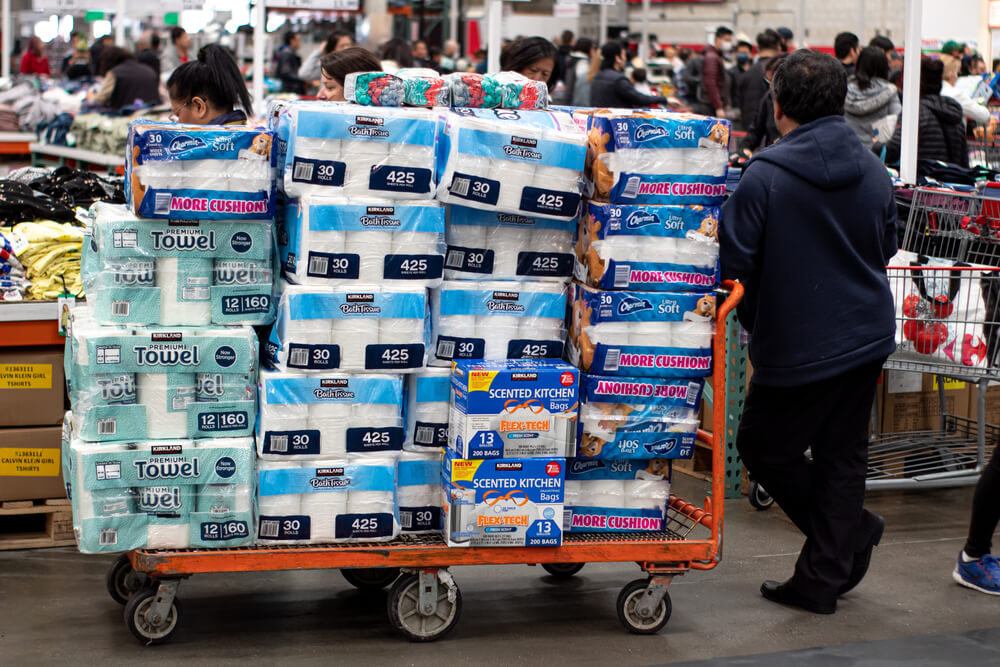Las Vegas officials strongly advised residents to only buy the essentials after stores were depleted of provisional necessities, including hard-to-find toilet paper.
Las Vegas has been especially hard hit by convention cancellations, as well as a decline in tourism and the layoffs at the resorts and casinos.
Struggling to Meet the Demand
Companies nationwide are speeding up production to meet the huge increase in demand, reported Dave Brower, vice president of risk management for a local trucking company, Truline Corp. Truline delivers products to businesses, and the level of deliveries to stores around the Las Vegas Valley has sharply increased.
“Our business has picked up quite a bit, and we’re all working together to do it,” Brower said. “So far, we’ve been able to meet the demand the stores are requesting to keep the commodities on the shelves.”
The Federal Motor Carrier Safety Administration has authorized Truline to have more flexibility on hours of service. Typically, drivers are only allowed to work 14 hours and drive for 11 hours. With the increased demand, as well as wait times at distribution centers increasing from 2-4 hours to more than 6 hours, the hours have been expanded.
“This leeway allows us to do the work safely,” Brower said.
Clark County Advisory
Clark County Commission Chair Marilyn Kirkpatrick advised citizens to buy two weeks of supplies, but advised against stocking up for a month.
“We have a lot of people in our community on fixed incomes, or they don’t have the money to stock up,” she said. “We need to ensure that when these people go to the grocery store, there will be stuff available for them.”
Small businesses can apply for emergency loans through the Vegas Chamber at VegasChamber.com, reported Mary Beth Sewald, the Chamber’s president, and CEO.
“We want to ensure that the biggest chamber can provide every resource we can,” Sewald said.
The Las Vegas Metropolitan Police Department also issued a plea to the public concerning the run on stores.
“One thing we want to let the public know is we acknowledge this is a difficult time in the world right now, but there’s no reason for anyone to be going to the stores late at night and hoarding supplies. The fact is, that there are plenty of supplies in the stores at this point,” Officer Aden Ocampo Gomez noted.
Panic Buying
Many psychologists, as well as mental health researchers, call this sort of mass shopping an emotional response to the impact the coronavirus outbreak will have on the nationwide economy.
“People feel they need to do something to keep their family safe. What else can they do besides washing their hands and self-isolate?” said Steven Taylor, a psychiatry professor at the University of British Columbia. According to Taylor, many of these behaviors also occurred during previous pandemics, including the 1918 Spanish pandemic.
Economists suggest that people could be attempting to eliminate one relatively easy risk. This is what is called “zero risk bias”.
“My guess is people with limited budgets want to feel in control,” noted Farasat Bokhari, a health economist at the University of East Anglia in Great Britain. “So they go buy something cheap, that they can store, and that they know at the back of their mind that they’re going to use anyway.”
While Nevada health officials have announced just 21 cases of coronavirus in the entire state, with 16 cases in Clark County, one in Carson City and four in Washoe County, Governor Sisolak has ordered a statewide shutdown of all nonessential businesses for 30-days. That includes casinos and it also includes overnight camping at state parks.
The list of nonessential businesses also includes:
- Brothels and strip clubs
- Casinos
- Arenas, concert venues, auditoriums, and stadiums
- Conference rooms, cafeterias and meeting halls
- Recreational facilities, including community centers, fitness centers, and yoga studios
- Beauty salons, including barbershops, tanning, waxing, hair and nail salons
- Retail, including shopping malls with the exemption of pharmacies
The guidance does allow for carry-out, delivery, and drive-through restaurant services.

